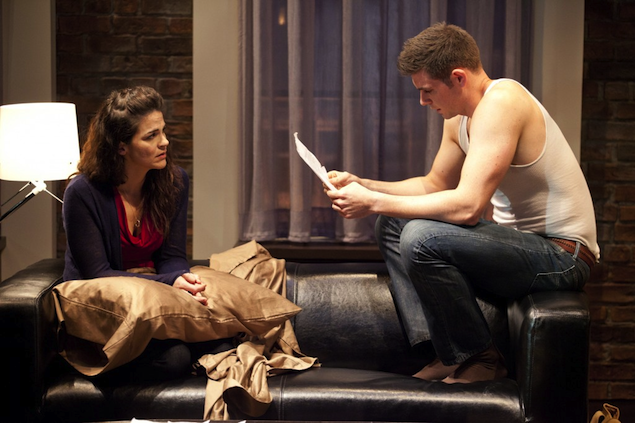
In many ways, the flawed characters in
Christopher Shinn’s
Dying City, currently playing at Signature Theatre, are emblematic of their age. All the neuroses,
hurt, and long-stifled childhood wounds that accompany being a thirtysomething in
the 21st century are on full display, from parental aggression to war to death. It’s
no coincidence that Kelly (Rachel Zampelli) is a therapist by profession, or that she obsessively Tivos
The Daily Show and
Law & Order reruns to watch instead of thinking.
It’s also telling that Kelly’s husband, Craig (Thomas Keegan), was killed in Iraq, in circumstances we never fully understand. In fact, there
are far more ideas thrown around in
Dying City than the play’s sparse one-hour running time allows for. Director
Matthew Gardiner, who skewered millennials so brilliantly in last season’s
Really Really,
takes on the more problematic
weltschmerz of Generation X this time around, and while both actors effectively portray Prozac
Nation, there’s so much hinted at that the show’s end feels abrupt, almost premature.
Keegan does superb double duty as Peter, who drops in on his identical twin’s unhappy
widow a year after his death, and as Craig, in flashbacks to the latter’s last night
at home before his final tour. The fragility of the relationship between Kelly and
Peter is nicely rendered at first, with both characters visibly on edge. And as Peter
disappears into one room, Craig emerges from another, wearing a different shirt and
as quietly stoic as Peter is self-absorbed and hyperactive. It’s no challenge at all
to perceive them as completely different people.
Amid
Daniel Conway’s set, which feels like any cozy (read: tiny), bookish New York City apartment, Peter
and Kelly attempt to stick to pleasantries—he tells her about the play he’s currently
starring in, Eugene O’Neill’s bleak family drama,
A Long Day’s Journey Into Night—but their mutual loss feels oppressively present. Zampelli is quietly empty as Kelly,
as if bereavement has stripped her of much in the way of personality, but as moments
from her past are revealed, she becomes even harder to understand. There’s a fine
line between ambiguity and confusion, and so many varying facts emerge—particularly
regarding the nuanced relationship between Peter and Kelly—that it’s hard to make
sense of them all.
Colin K. Bills’s lighting does an excellent job of hinting that we’ve gone back in time, but the
rapid pace with which the actors trade lines doesn’t allow for much time to digest
everything that’s going on.
It’s hard not to wonder if Craig’s character might have been best left unseen, particularly
since the e-mails he sent his brother from Iraq (e-mails Peter prints out and carries
around in a sweetly Victorian gesture) are so unrealistically eloquent. It’s a little
too convenient that the sensitive, thoughtful brother who’s a devoted fan of Faulkner,
Hemingway, Hawthorne, and Melville leaves such beautifully written prose to remember
him by, especially since they reveal unwelcome but half-suspected truths to Kelly.
It’s almost as if Shinn wanted a way to express dissatisfaction with the war but realized
his characters were too self-aware to say such things sincerely.
In fact, it’s the character of Peter, vacuous, narcissistic, and emotionally indiscriminate
as he is, who feels the most honest, given that Kelly’s core is concealed under a
layer of cardigans and pain and Craig is seen only selectively. While the show’s haste
is symbolic of its hurried, harried age, you can’t help wishing for a few more Pinterian
pauses to try to figure out what everyone is thinking. “It is unclear which way the
narrative of the war will turn,” Craig writes, sounding more like a politician making
a speech than a thirtysomething dashing off an e-mail to his brother. The same could
be said about this production, even as it illuminates the sad vacuity of the modern
world.
Dying City
is at Signature Theatre through November 25. Running time is one hour, with no intermission.
Tickets ($39 to $79) are available via Ticketmaster.


















